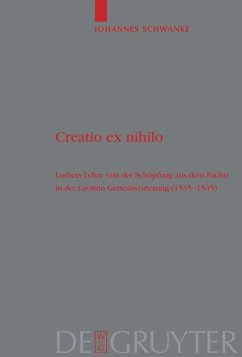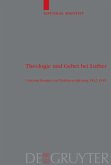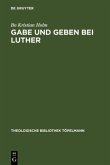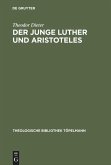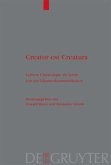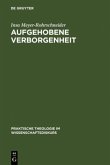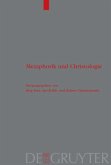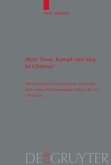This first monograph on Luther's doctrine of the creatio ex nihilo demonstrates the comprehensive character of his interpretation of the phrase, emphasises its present-day significance and inquires into its theological and philosophical backgrounds. If the notion of creation from nothing runs counter to all logic and experience, the author works from Luther's great lecture on Genesis to show that for Luther the phrase names neither the "Whence" of creation nor the scientific "How" of its genesis. Rather, it answers the question of the relationship between creator and creature - in creation, maintenance and re-creation. Thus the formulation creatio ex nihilo is no peripheral determination of divine action, but the basic matrix of the Creator's dealings with humans and the world.
Diese erste Monographie zu Luthers Lehre von der creatio ex nihilo zeigt den umfassenden Charakter seiner Interpretation der Formel, betont ihre Gegenwartsbedeutung und fragt nach theologischen und philosophischen Hintergründen. Spricht eine Schöpfung aus dem Nichts auch gegen jede Logik und Erfahrung, so zeigt der Verfasser ausgehend von Luthers Großer Genesisvorlesung, dass die Formel für Luther weder das kausale "Woher" der Schöpfung benennt noch das naturwissenschaftliche "Wie" ihrer Entstehung: Sie beantwortet vielmehr die Frage nach dem Verhältnis von Schöpfer und Geschöpf - in Schöpfung, Erhaltung und Neuschöpfung. Die Formel creatio ex nihilo ist damit keine periphere Bestimmung göttlichen Handelns, sondern Grundmatrix seines Umgangs mit Mensch und Welt.
Hinweis: Dieser Artikel kann nur an eine deutsche Lieferadresse ausgeliefert werden.
Diese erste Monographie zu Luthers Lehre von der creatio ex nihilo zeigt den umfassenden Charakter seiner Interpretation der Formel, betont ihre Gegenwartsbedeutung und fragt nach theologischen und philosophischen Hintergründen. Spricht eine Schöpfung aus dem Nichts auch gegen jede Logik und Erfahrung, so zeigt der Verfasser ausgehend von Luthers Großer Genesisvorlesung, dass die Formel für Luther weder das kausale "Woher" der Schöpfung benennt noch das naturwissenschaftliche "Wie" ihrer Entstehung: Sie beantwortet vielmehr die Frage nach dem Verhältnis von Schöpfer und Geschöpf - in Schöpfung, Erhaltung und Neuschöpfung. Die Formel creatio ex nihilo ist damit keine periphere Bestimmung göttlichen Handelns, sondern Grundmatrix seines Umgangs mit Mensch und Welt.
Hinweis: Dieser Artikel kann nur an eine deutsche Lieferadresse ausgeliefert werden.
"This outstanding study of Luther's theology of creatio ex nihilo- the first monograph on this topic- offers a comprehensive interpretation of this central but neglected theme, combining remarkable erudition with appreciation for the scope and significance of Luther's thought. This is scholarship of the first rank: highly recommended." Prof. Dr. John Webster, Lady Margaret Professor of Divinity, University of Oxford
"To be created out of nothing is to be nothing without God. Dr. Schwanke's Dissertation shows how important this is for Luther and the Doctrine of Grace. His work is impressive and should provoke friendly discussion." Sir Henry Chadwick, Regius Professor em. of Divinity, of the Universities of Oxford and Cambridge
"To be created out of nothing is to be nothing without God. Dr. Schwanke's Dissertation shows how important this is for Luther and the Doctrine of Grace. His work is impressive and should provoke friendly discussion." Sir Henry Chadwick, Regius Professor em. of Divinity, of the Universities of Oxford and Cambridge
"Der Leser bekommt Lust, beim Schriftausleger Luther in die Schule zu gehen. In der heutigen Zeit ist ein solches Lektüre Resultat nichts weniger als eine "creatio ex nihilo .
Armin Wenz in: Lutherische Beiträge 3/2009
"Das Buch von Johannes Schwanke schließt eien Lücke der Forschung."
Jürgen Bründl in: Theologische Revue 4/2006
"Ein wichtiger Beitrag zur Theologie Luthers."
Gerhard Müller in: Luther 2006
"This outstanding study of Luther's theology of creatio ex nihilo - the first monograph on this topic - offers a comprehensive interpretation of this central but neglected theme, combining remarkable erudition with appreciation for the scope and significance of Luther's thought. This is scholarship of the first rank: highly recommended."
Prof. Dr. John Webster, Lady Margaret Professor of Divinity, University of Oxford
"To be created out of nothing is to be nothing without God. Dr. Schwanke's Dissertation shows how important this is for Luther and the Doctrine of Grace. His work is impressive and should provoke friendly discussion."
Sir Henry Chadwick, Regius Professor em. of Divinity, of the Universities of Oxford and Cambridge
Armin Wenz in: Lutherische Beiträge 3/2009
"Das Buch von Johannes Schwanke schließt eien Lücke der Forschung."
Jürgen Bründl in: Theologische Revue 4/2006
"Ein wichtiger Beitrag zur Theologie Luthers."
Gerhard Müller in: Luther 2006
"This outstanding study of Luther's theology of creatio ex nihilo - the first monograph on this topic - offers a comprehensive interpretation of this central but neglected theme, combining remarkable erudition with appreciation for the scope and significance of Luther's thought. This is scholarship of the first rank: highly recommended."
Prof. Dr. John Webster, Lady Margaret Professor of Divinity, University of Oxford
"To be created out of nothing is to be nothing without God. Dr. Schwanke's Dissertation shows how important this is for Luther and the Doctrine of Grace. His work is impressive and should provoke friendly discussion."
Sir Henry Chadwick, Regius Professor em. of Divinity, of the Universities of Oxford and Cambridge

